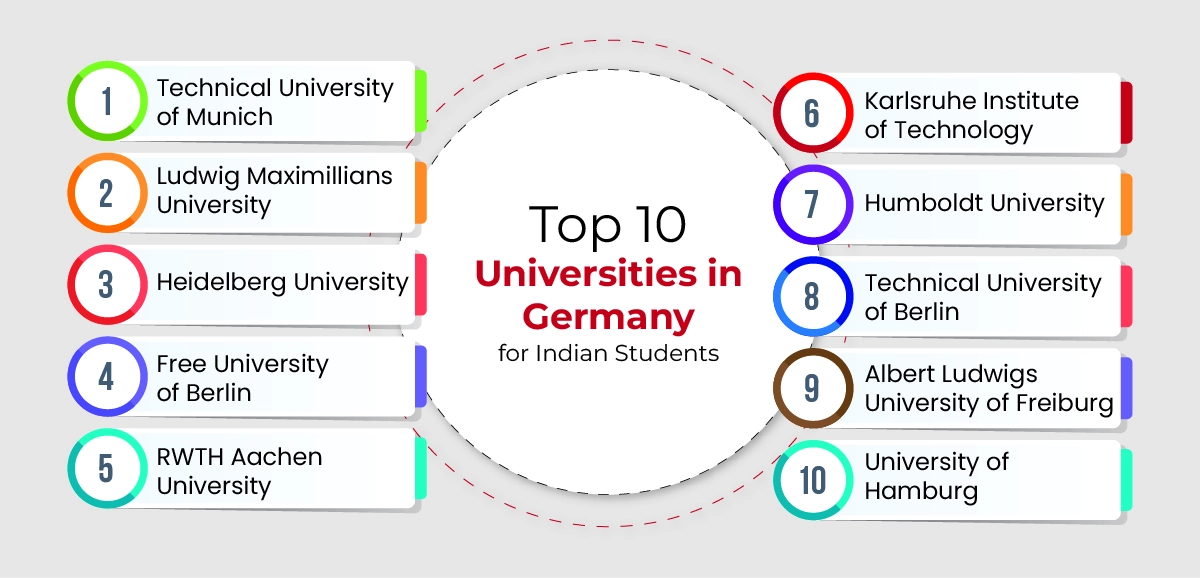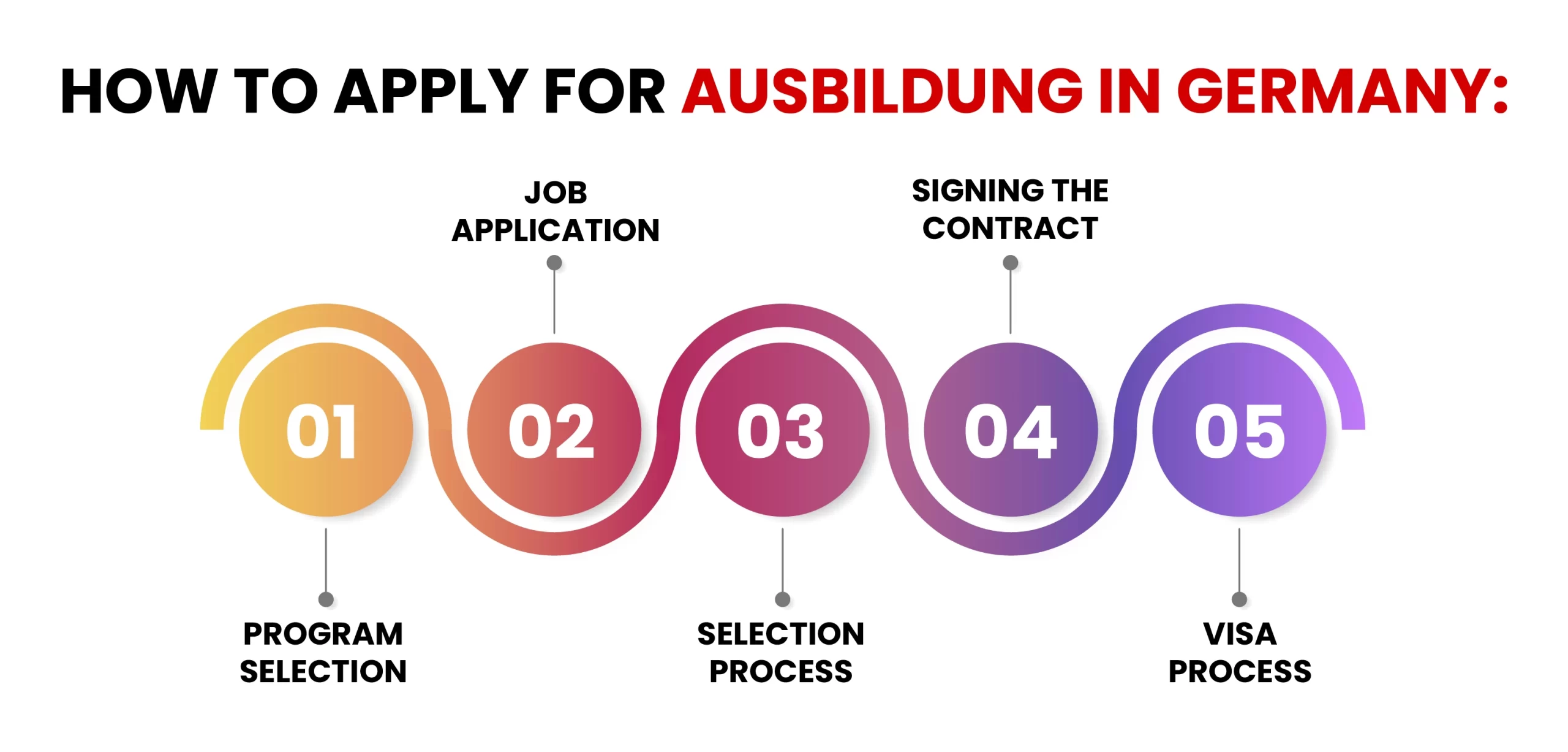Germany is widely recognised for its efficient educational and technological advancements, which in turn makes it a safe haven to kickstart their higher education at one of the best universities in Germany for Indian students. But the students seem to be unclear when choosing the right college or university, as there are numerous institutions (as of April 2024, 423 institutions). Hence, this blog offers perspectives about top-ranked universities in Germany for Indian students.
This blog drives you with certain sections, such as the Top universities in Germany for Indian students and their eligibility norms, the application process, and scholarships. Towards the end, it addresses a few questions about which a student might inquire.
Table of Content
1Why Study in Germany2Top 10 Universities in Germany for Indian Students3Eligibility Criteria to Study at Universities in Germany for Indian Students4Application Process & Tips5Scholarships in Germany6In the End…7Frequently Asked Questions ( FAQ )
Why Study in Germany
- Affordable (or) No Tuition Fee for domestic as well as international students.
- Top-ranked universities in Germany are indexed in the overall best global rankings.
- Home to High-quality and consistent upgrades in the syllabus for a wide variety of courses.
- High-end infrastructure and student-friendly environment.
- Global leader in Research & Innovation with a strong industrial background.
- Welcoming nature of diversified culture on account of abroad students’ arrival.
- German Education opens the door to the global job market.
Top 10 Universities in Germany for Indian Students

Public universities in Germany, which constitute the majority of the country’s higher education system, only charge admission and transportation fees and not the tuition fee. This feature attracts foreign students, particularly Indian students, to enroll themselves in universities in Germany. Following is the list of the top 10 universities in Germany preferred by Indian students:
1. Technical University of Munich
2. Ludwig Maximillians University
3. Heidelberg University
4. Free University of Berlin
5. RWTH Aachen University
6. Karlsruhe Institute of Technology
7. Humboldt University
8. Technical University of Berlin
9. Albert Ludwigs University of Freiburg
10. University of Hamburg
The brief explanation about the ranked universities in Germany would be as follows –
1. Technical University of Munich (TUM)
TUM, the only university in Germany, secured its place in the QS World Rankings under the top-50. The university was incorporated in 1868, and it holds up its ground strongly in engineering, natural sciences, and technology. With 3 campuses and 15 departments, the university collects zero tuition fees. Instead, it collects the semester fee for the final exams. The popular courses are –
- Engineering
- Computer Science and Technology
- Natural Sciences
- Architecture and Urban Planning
- Material Science and Engineering
| Germany Rank | QS World Ranking, 2024 | Times Higher Education Ranking, 2024 | Intake of Students |
| 1 | 37 | 30 | October, April |
2. Ludwig Maximillians University (LMU)
LMU is the public university in Germany, and it is also known as the University of Munich. It was founded in 1472 and is considered to be one of the oldest and most prestigious German universities. The university is the leading research university with over 500 years of experience in the fields of education and research. The popular courses here are –
- Natural Sciences
- Medicine and Life Sciences
- Law
- Business Administration and Economics
- Social Sciences
| Germany Rank | QS World Ranking, 2024 | Times Higher Education Ranking, 2024 | Intake of Students |
| 2 | 54 | 38 | October, April |
3. Heidelberg University
Heidelberg University is the oldest university in Germany, founded in 1386. It is an open-research university that is known for its expertise in Medicine & Research. Like the other two universities, the university attracts a diverse student body around the world and the popular courses are –
- Medicine
- Law
- Theology
- Philosophy
- Economics and Social Sciences
| Germany Rank | QS World Ranking, 2024 | Times Higher Education Ranking, 2024 | Intake of Students |
| 3 | 87 | 47 | October, April |
4. Free University of Berlin
Free University was founded in 1948, which was the aftermath of the Second World War. The university was formed with the motto of focusing on interdisciplinary studies. The university is famous for those who pursue a Masters in Germany in the field of human sciences. The popular courses are –
- Social Sciences
- Natural Sciences
- Humanities
- Engineering
- Medicine and Life Sciences
| Germany Rank | QS World Ranking, 2024 | Times Higher Education Ranking, 2024 | Intake of Students |
| 4 | 98 | 102 | October, April |
5. RWTH Aachen University
RWTH (Rheinisch-Westfälische Technische Hochschule) Aachen University is the largest university in the sector of engineering and technology and was founded in 1870. This university is good for students with passion or innovation. The university has a strong industrial connection, which provides students with opportunities for practical applications. The popular courses are –
- Engineering
- Sciences
- Education
- Computer Science & IT
- Agriculture & Veterinary
| Germany Rank | QS World Ranking, 2024 | Times Higher Education Ranking, 2024 | Intake of Students |
| 5 | 106 | 90 | October, April |
6. Karlsruhe Institute of Technology (KIT)
KIT is one of the top public universities in Germany, having been established in 1956. It is the only German university of excellence with national large-scale research that combines a long university tradition with cutting-edge programmatic research. It offers a wide variety of courses across different sectors and some of the notable courses are–
- Engineering
- Natural Sciences
- Architecture
- Economics and Management
- Humanities and Social Sciences
| Germany Rank | QS World Ranking, 2024 | Times Higher Education Ranking, 2024 | Intake of Students |
| 6 | 119 | 140 | October, April |
7. Humboldt University
Humboldt University was founded in 1810. It was termed “the mother of all universities” because of its role in shaping modern higher education. The university is one of the notable public colleges/universities in Germany, and the popular courses offered are:
- Agriculture and Veterinary
- Sciences
- Visual and Performing Arts
- Education
- English and Literature
| Germany Rank | QS World Ranking, 2024 | Times Higher Education Ranking, 2024 | Intake of Students |
| 7 | 120 | 87 | October, April |
8. Technical University of Berlin
The internationally renowned Technical University of Berlin was founded in 1879. The university is known for the arrival of international students, comparatively. The courses offered by the university are vast and some of the popular courses are:
- Agriculture and Veterinary
- Sciences
- Education
- Engineering
- Foreign Language
| Germany Rank | QS World Ranking, 2024 | Times Higher Education Ranking, 2024 | Intake of Students |
| 8 | 154 | 136 | October (mostly) |
9. Albert Ludwigs University of Freiburg
Albert Ludwigs University, also called the University of Freiburg, was founded in 1457. The university provides more than 150 courses at different levels of certification across its 5 campuses. Because of its overwhelming certifications, international students often come here to pursue bachelor’s or master’s degrees in one of Germany’s renowned institutions. Some of the popular courses are:
- Arts & Humanities
- Social Sciences
- Natural Sciences
- Engineering and Technology
- Medicine and Life Sciences
| Germany Rank | QS World Ranking, 2024 | Times Higher Education Ranking, 2024 | Intake of Students |
| 9 | 192 | 128 | October, April |
10. University of Hamburg
The University of Hamburg was established in 1919, post-World War I. The university was formed by merging several other educational institutions, and it stands as a prominent research hub in Germany. Though it may be ranked last, it is one of the preferred universities in Germany for Indian students because of its no tuition cost and wide variety of ever-upgrading courses. Some of the popular courses are:
- Social Sciences
- Environmental Studies & Earth Sciences
- Natural Sciences & Mathematics
- Humanities
- Law
| Germany Rank | QS World Ranking, 2024 | Times Higher Education Ranking, 2024 | Intake of Students |
| 10 | 205 | 136 | October, April |
Eligibility Criteria to Study at Universities in Germany for Indian Students
The Indian students are so passionate about learning from the universities in Germany because of the country’s advancement towards the technological future. But the eligibility criteria vary throughout the universities. Hence, the students who wish to start their career in Germany, are advised to visit the official website for an up-to-date requirement. But still, the following is the common eligibility criteria across the universities in Germany
- APS Certificate – Certificate that levels the educational qualification from the home country that matches with the German universities. The list of required documents for APS are :
- Passport
- Marksheets
- Certificates
- Languages Certificates (German/English)
- Application Fee (₹18,000)
- The process would take upto 4 weeks for getting an APS certification. For guidance regarding the APS certification, contact CanApprove.
Application Process & Tips
From the above, one can infer that securing admission to one of the public universities in Germany might seem challenging because of the non-uniform eligibility criteria. However, the following five-step application process helps to understand the flow:
Step–1: Choosing the Course and College
- Go to the DAAD website (Click Here).
- Gather the basic knowledge about the course and college.
- Visit the official website of the college and check for the requirements.
Step–2: Preparing the Documents
- After finalizing, start to collect the necessary documents such as motivation letter, cv and so on as per the requirements.
- Make sure that the documents are clear enough to provide the relevant information.
Step–3: Filing an Application
- There are two ways to file an application – Direct (or) uniassist.
- In case of direct, visit the official website, file the application and pay the application fee.
- In case of uniassist (Click Here), select the college and university from the affiliated 170 universities and then apply for it.
Step–4: Pre-Visa Documentation
- After securing admission, it is time to apply for the visa process.
- Gather the necessary documents using the checklist from the official embassy (Click Here)
Step–5: Applying for Visa
- Applying visa can be done via following methods – Mobile, Online (or) VFS Global (Click Here).
- Book an appointment for an interview in the Germany Consulate and carry the attested documents.
- Pay for the application fee after the interview and obtain the student visa.
Scholarships in Germany
The scholarships provided at Universities in Germany for Indian students consists of three types – Govt. Funded, Non-Govt. Funded and University Funded.
Government Funded Scholarships
- Deutscher Akademischer Austauschienst Scholarships (DAAD)
- European Community Action Scheme for the Mobility of University Students scholarships (ERASMUS+)
Non-Government Funded Scholarships
- European Community Action Scheme for the Mobility of University Students scholarships (ERASMUS+)
- Heinrich Boll Scholarship
- Bayer Foundation Scholarships
- DLD Executive MBA Scholarship
University Funded Scholarships
- Goethe Goes Global Scholarship
- AICES Scholarship
- Jacobs University Scholarship
- EMS Undergraduate Scholarship
In the End…
Wrapping it up, the dream of studying abroad won’t be just a dream. With proper guidance and knowledge, every dream will become a reality. Keeping that in mind, we provided every piece of relevant information regarding the universities in Germany for Indian students. And so, this blog will act as a first step of knowledge towards your abroad education career, and for guidance, consider visiting CanApprove.















